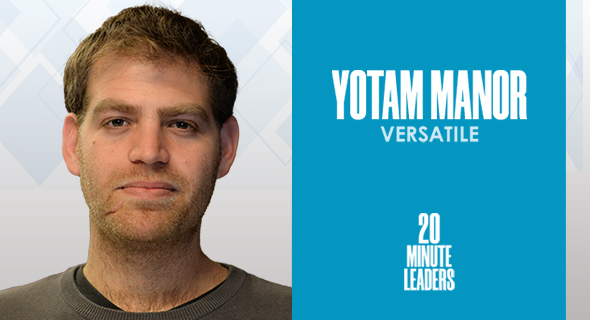20-Minute Leaders
"My main inspiration is my baby boy. A baby is in a growth mindset like no adult can be.”
The way a baby learns something new every day and faces challenges is inspiring to Yotam Manor, R&D manager at Versatile.
Click Here For More 20MinuteLeaders
Who is Yotam Manor?
I'm 33 years old. I live in Tel Aviv with my wife, Hili, and our baby boy, Carmel, who is seven months old. Answering the question of who I am is something, obviously, I struggle with every day. My path has been an attempt to give answers that resonate with me on a daily basis.
I found myself, in the last few years, highly engaged in tech and engineering via leadership positions. But I did not come from a background where it was very clear that this would be where I would end up. Through a lot of search and trial and error, I think I am now very happy with the place where I'm working in and acting in the world.
What draws you into the engineering world and into management positions within engineering?
I will start with my path to engineering. I am driven by a desire to be impactful in the way I operate in the world. I want my actions to have some sort of lasting effect. I considered earlier in life focusing on public policy roles. That was the major motivation in studying philosophy, politics, and economics in school. Eventually, I ended up feeling that using technology as a force multiplier for impact at scale really resonated with me.
In contrast, an educator who works with students may have a very deep impact on a very narrow number of people. That's very respectable and admirable. But I am looking for the breadth. That comes with being able to operate at scale. In today's world, technology is one of the main ways where you can do that. I wasn't a PC kid, but I was engaged with computers and I have that orientation, and that is where my search led me.
Tell me a little bit about leadership and engineering. What is happening there? How do you perceive your own leadership style?
Let's start with what doesn't work often. One is where an engineer is good at engineering, has no orientation toward leadership, and is being promoted to a leadership position because they’re the best engineer. Then you often have the worst of both worlds where the person who's good at engineering doesn't get to do what they're good at. And they're not oriented toward the questions of leadership and are serving their teams or organizations badly.
Then on the other side of the spectrum, you have the problem where technical leadership does require you to be very oriented toward technology. You need to be able to navigate the engineering questions at hand. It's not just the people question or the organization question. You need to be able to cut through the noise and find the right solution. There are always questions about trade-offs. The interesting part is when you understand that sometimes the trade-off is a false trade-off. That is the key place where your skill as an engineering leader plays an important part.
 Participant: Yotam Manor, R&D manager at Versatile. Photo: Or Kaplan Photography
Participant: Yotam Manor, R&D manager at Versatile. Photo: Or Kaplan Photography
What is the jump that, in your mind, an engineer needs to make in order to get that understanding?
One thing is having an eye on the bigger picture. That's the first of the main difficulties you see with engineers struggling to make that step to management. It might not even be a promotion but leading a project or making a tough decision. Andrew Grove in his book, High Output Management, refers to every knowledge worker as a manager. Engineers are almost always, to some extent, managers.
The untrained project manager may miss the bigger point and may lock themselves in false trade-offs that arise from purist technological ideals. They're not pragmatic enough to be able to navigate through organizational waters and lack the perspective of how what the engineer builds meets the user in the end.
What do you, as an engineering leader, have to do or what do you think is your role in helping develop engineers within your own organization?
I'm always trying to think on the individual level, "How would this person grow? What is the growth path for that particular person?” I'm always trying to ask that question myself. Then I engage with that person where they are. I would not necessarily take the person to a Tuesday meeting and say, "You don't communicate your anger well." But I would wait for the moment where the person would be receptive to that kind of message. That requires a very keen eye to see when a person feels that they're doing not as good as they can and they're receptive to feedback that would help them grow.
Obviously, sometimes you just need to break it to them whether they're ready or not. What I described is another tool in the toolbox. You just have to keep that in mind.
What do you enjoy most about your work?
I like to align people. Misalignments just arise naturally in every context where there is more than one person. They are a block on a road to success. Being able to pick up on those misalignments and help them talk to each other about the thing and then things work, it gives me a lot of joy. I also enjoy solving bugs and delivering code. But I also love solving the organizational bugs.
With managing people, it's not that trivial that you also spend time coding. But your time leading is probably more impactful than the algorithm that you're going to contribute. How do you navigate through that?
What I enjoy matters more on the weekends than on weekdays. I always try to keep in mind that the decision needs to be derived from what is best for the company. And more often than not, it means coding less. In some contexts, it means rolling up the sleeves and writing it yourself to a certain extent. But it has to be worth it for the organization because the price is high. My impact should be through other people, not through the keyboard, generally speaking.
Take me back to middle school or elementary school. What really inspired you or fascinated you?
I was very fascinated, at least since first grade, with social structures. I would just sit in class and try to analyze who is the head boy, what does it mean to be a follower, and looking at the girls’ structure and having no clue at all how that works.
I also liked dinosaurs. Don't get me wrong.
What inspires you in your day-to-day life?
My main inspiration is my baby boy. A baby is in a growth mindset like no adult can be. Every day he learns something new and faces his challenges head on. That's really inspiring.
What are a few words that you would use to describe yourself?
Thoughtful, pragmatic, and curious.
 Michael Matias. Photo: Courtesy
Michael Matias. Photo: Courtesy
Michael Matias, Forbes 30 Under 30, is the author of Age is Only an Int: Lessons I Learned as a Young Entrepreneur. He studies Artificial Intelligence at Stanford University, is a Venture Partner at J-Ventures and was an engineer at Hippo Insurance. Matias previously served as an officer in the 8200 unit. 20MinuteLeaders is a tech entrepreneurship interview series featuring one-on-one interviews with fascinating founders, innovators and thought leaders sharing their journeys and experiences.
Contributing editors: Michael Matias, Megan Ryan



